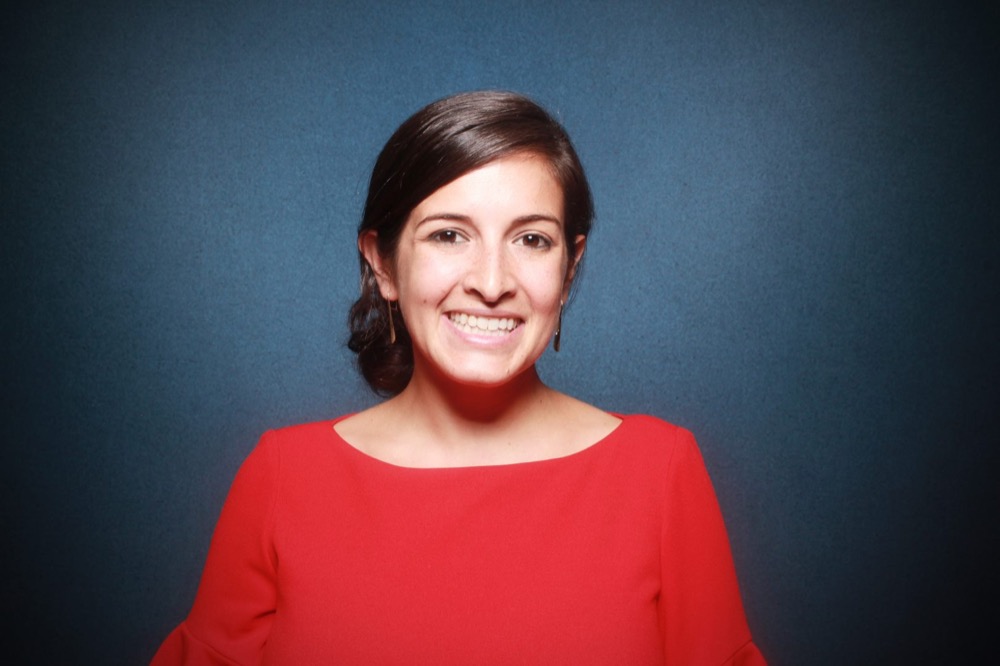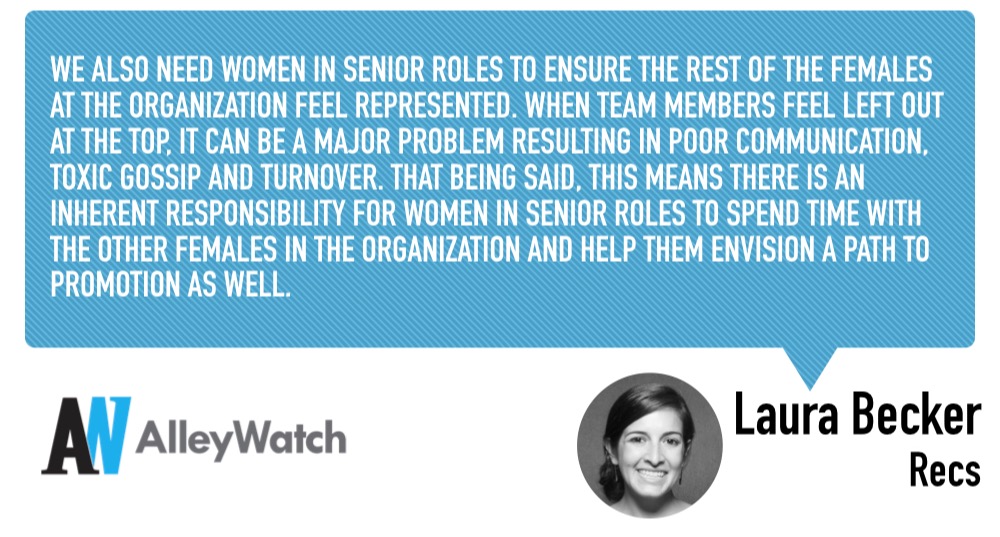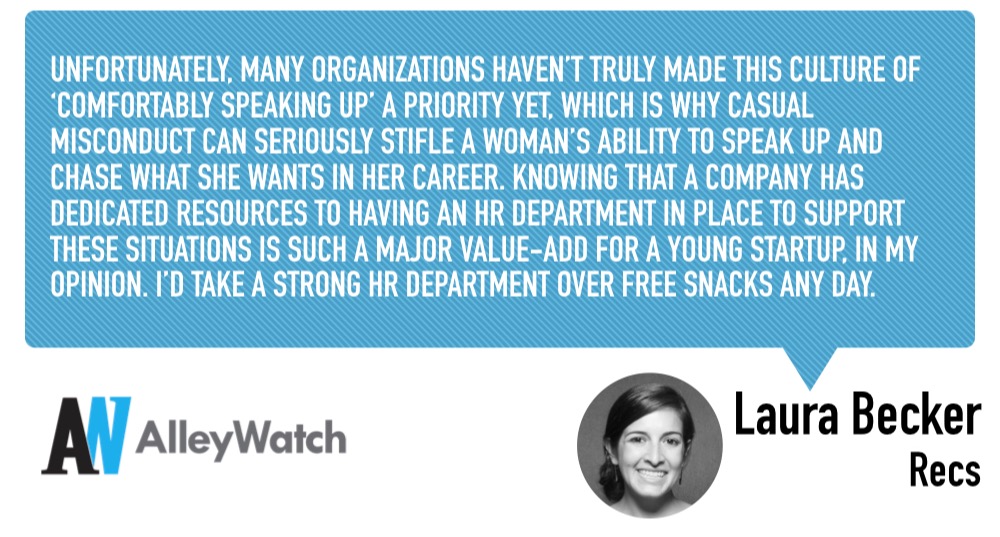Are you a woman in NYC Tech and interested in participating in this series? Make sure to read the whole article…
Much has been said and written about the lack of women in the tech sector, be it as investors (or associates), founders, or in management positions at major companies. Is the problem the old boys’ network – or that success in technology is seen as a young man’s game? In this series, we speak with some of the top women in tech in New York as they discuss the challenges they face, the perceptions that need to be changed and the work that’s being done – or not – to help to promote women in tech.
Today we speak with Laura Becker the CEO and founder of Recs, the centralized platform that allows users to share travel recommendations with friends. It seems to be the natural, byproduct of Becker’s experiences and an untraditional path to tech, which she candidly shared with us. After graduating from USC undergrad, Becker decided to pursue her passion for music by working as a music venue publicist. As a publicist, she worked long, hard hours and was broke. It was during this experience that she learned the value of stretching a dollar and decided to create a website called NYCbroke, which featured the best food and drink deals across the city. Eventually, Becker landed a job to oversee NYC Events at LivingSocial and then became a VP at the concert discovery platform Songkick. While Becker loved every second of expanding Songkick and intensely battling the incumbents in the space, she couldn’t get rid of the desire to start her own company, so Becker left SongKick to found Recs.
Laura Becker, Recs
What’s your background and how did you develop your career as a female entrepreneur in the NYC tech ecosystem?
I’ve always had a passion for people and truly believe you can learn something new and interesting from everyone that crosses your path. That obsession with connection is what I believe helped to shape a career in sales and team management over the last 9 years. Ultimately, it’s what also led me to start Recs, a platform for recommendation-sharing–currently focused on travel–at Recs.com.
My background in tech is a bit non-traditional. After graduating from USC, I was dead set on working in the music industry and took my first gig out of college as a music venue publicist. I learned on the fly, working 500+ shows a year until the wee hours of the night, was completely broke and became really good at stretching a dollar. Eventually, I decided to build a website called NYCbroke.com, where I listed all of the best food and drink deals to help my fellow broke friends discover what I knew.
NYCbroke and that experience in live music led to an incredible offer from a friend to oversee the new NYC Events division at the e-commerce daily deals company, LivingSocial (once valued at $6B, second to Groupon in the space). Immediately, I was thrown into sales, event planning, marketing, team management, operations, more sales, client management, hiring, ticketing – you name it. It was wild and it was the best. Over four years, I had hired
and trained 75 people, took 90,000 customers offline on trips across the Northeast and learned how to effectively manage a growing team.
Although I had to be a jack-of-all-trades, LivingSocial is where I started to hone in on sales and management, which I took to my next role (another opportunity from a friend) at the artist ticketing startup, CrowdSurge, later merging with the concert discovery platform, Songkick. As a VP at Songkick, I felt truly rewarded helping the biggest artists in the world create a fair and direct ticketing experience for fans, battling Live Nation/Ticketmaster along the way. I loved every second but that desire to start my own thing always lingered.
Then, last summer, after 15+ friends asked for my recommendations following a trip to Cuba, I realized the problem I had tried to solve for with NYCbroke still wasn’t fixed nine years later. Trusted travel endorsements from friends are invaluable in making decisions but sharing them can be painful. It really should be as easy as sharing photos on Instagram. So, I left Songkick to launch Recs and here we are.
On the side, I’m also a sales consultant helping small/medium tech startups scale, which has been a challenging and educational experience that continues to keep me sharp every day!
What are the advantages of being a woman in tech?
The female tech community in NYC is massive. There are so many female-focused events, Slack groups, conferences and Meetups that you can attend every night if you’re interested. In fact, if you really dive into it, it can be a bit overwhelming. The advantage there is that women want to meet and support each other and I can say, from personal experience, that the female founder community in NYC is made up of some of the kindest, most authentic people I’ve ever met. You just have to be willing to put yourself out there but what do you have to lose?
Also, with women being underrepresented in each of the industries I’ve worked in from music to travel to tech, the opportunity to make a name for yourself as a female leader who can inspire the future of females is very attainable. That’s an incredibly rewarding role to strive for, in my opinion.
What can be done to further promote female entrepreneurs and women in tech in New York?
To me, it’s the day-to-day things that can have an almost instant effect. The next time a female more junior in her career asks to meet for coffee, give her 30 minutes. We are all busy, but the more we offer of ourselves, the more that person will do the same down the line.
I ran into tons of obstacles and made plenty of mistakes in my career to date, and I’ve learned that sharing the specifics makes such a big difference to younger women who may feel a bit lost. It’s easy when you’re starting out to feel like, “Why does everyone else just seem to get it?” or “How can I possibly afford to live in NYC?” or my favorite, “How is everyone always on vacation? Don’t they need to work?!” Ha – but really! It’s so important that we keep it real with each other.
It’s all about helping females feel comfortable and confident in their path, whatever that path may be. If you believe in someone, support them in reaching the next step in their journey however you can.
 What is diversity to you and do you see it evolving in tech?
What is diversity to you and do you see it evolving in tech?
To me, diversity is genuinely believing that the best decisions come from people with different experiences and backgrounds working together. I’ve always been a fan of the Churchill quote, “If two people agree on everything, one of them is unnecessary.” Diversity is what can allow for some of the best disagreements ever as well as some of the best ideas.
Honestly, I’m not sure that I’ve seen diversity evolve in tech as much as I wish it would have by now, but a ton of strides have been made in the last year. I definitely have seen male leaders eagerly looking to hire female leaders, in an effort to support diversity, while aiming to better represent the women at their organization and the female customers in their market. That’s a great thing.
The discussion feels front and center in the best way possible and I know there’s a lot more to come here.
Why do you think it’s important that women retain, grow, and develop into senior roles within their organizations?
Beyond the diversity effect mentioned above, women can offer an incredibly complementary skill set to the decision-making process that happens at the top of an organization.
This is purely anecdotal from my experience, but some of the women I’ve been lucky to work beside in senior roles have been deeply thoughtful and organized, in a well above average sort of way. In many cases, I’ve found many female colleagues to be less reactive than their male counterparts and more willing to do the extra hard, often tedious work when a solution to a problem proves to be less straightforward than expected. Simply put – it was important women were in senior roles because their skillset helped to complement the team and drive the entire organization forward.
We also need women in senior roles to ensure the rest of the females at the organization feel represented. When team members feel left out at the top, it can be a major problem resulting in poor communication, toxic gossip, and turnover. That being said, this means there is an inherent responsibility for women in senior roles to spend time with the other females in the organization and help them envision a path to promotion as well. The motivational component of a female leader being in that role is great, but it’s not always enough. We need managers (male and female) to prioritize time here, developing clear career paths for everyone on their team.
It’s statically proven that women-led companies are more successful than their male counterparts. Why do you think they still only get 2% of funding available for new ideas?
I believe it starts with the problem and opportunity that comes from having a strong network. I personally like to work with people I trust who I know like to work really hard. Male or female, it’s pretty easy for me to decide who I would like to work with again and who I wouldn’t. If we’ve never worked together, I might still like to work with you, but I have to do a lot more work to figure that out.
Since the bulk of the VC world is made up of men who have worked beside other men throughout their careers, it’s not surprising that they’re inclined to invest in men (or referrals from men) whom they also know and trust. That being said, this means they’re missing out on big opportunities from the women they may not know and it’s up to us to show them what they’re missing out on.
Generally speaking, in sales, this is the most challenging part of the sale. Asking a male VC, who doesn’t know you, “Why wouldn’t you get involved?” isn’t easy. Imagine receiving 25+ No’s from VCs you’ve never met but persisting on, while knowing the odds and watching your savings decrease every day. I haven’t had to fundraise for Recs yet, but I have an understanding from discussions with other female founders on how to best prepare for this. As female founders, we have to be exceptionally courageous, confident and persistent, which can be daunting and ultimately a deal-breaker for many.
Also, the data supports that the returns from women-led companies are beating the average, but I’m not sure those stats have been simplified and preached to the masses as much as we need. The 2% stat is pretty pervasive at this point, but the stats that show women founders are absolutely crushing it just doesn’t feel like common knowledge yet.
Please tell us about a few organizations that you are involved with or respect that are promoting women in tech.
I’ve really enjoyed being a part of SheWorx, an organization that puts on events for current or soon-to-be female founders beginning to explore fundraising. Brunchwork and Stacklist are two other organizations that bring in great speakers across various tech disciplines. All three welcome women and men and I’ve met some great people in tech at each.
I also attended the annual Inc. Women’s Summit last Fall, which wasn’t a cheap ticket, but for $350 or so left me with enough inspiration for the next 3+ months – and a handful of new female founder friends in NYC.
How much do you think casual sexual harassment and misconduct affects a woman’s career?
I feel fortunate to have been raised by a very strong, Brooklyn-bred Mom who taught me to always fight for right from wrong. I’ve done just that every time I’ve seen any type of toxic unprofessionalism at work and, in my experience, the organizations have always done what was needed to make it as right as possible. Misconduct is going to happen, and it’s up to the workplace to promote an openness that ensures everyone is comfortable speaking up so that issues can be addressed.
Unfortunately, many organizations haven’t truly made this culture of ‘comfortably speaking up’ a priority yet, which is why casual misconduct can seriously stifle a woman’s ability to speak up and chase what she wants in her career. For that reason, I believe having an HR department (even if it’s just 1 or 2 people to start, even part-time) can be so incredibly useful in providing a safe outlet to speak to when issues occur. Knowing that a company has dedicated resources to having an HR department in place to support these situations is such a major value-add for a young startup, in my opinion. I’d take a strong HR department over free snacks any day.
What can men do to support this movement and/or participate in this discussion?
As Managers and Founders, actively seek to promote the qualified women within your organization. If you know women may be less likely to speak up and ask for that promotion, initiate conversations with them. Be great bosses and ask how they see themselves growing at the organization, ask what skills they feel like are being underutilized, ask how they can benefit the organization in a more meaningful way, etc. Take the time to genuinely invest in these conversations with women. As I mentioned before, the more diversity in leadership positions, the more the entire company will benefit.
Also, companies with the means should offer to buy or subsidize tickets to some of these female-focused conferences and events. A little ‘Career Development’ budget goes a long way. The events are inspiring and filled with leaders who can help to motivate your talented staff to ask those hard questions and show off their skills on the job.
And if your company can afford it, again, dedicate resources to an approachable HR team! Your employees will appreciate it.
The team at AlleyWatch believes it’s important to have an inclusive discussion around the challenges facing women in tech along with highlighting the work of the female entrepreneurs that have made NYC one of the best places for women in tech according to some recent studies. That’s why we are running this series that showcases women in tech in New York.
If you are a female founder in NYC working in tech and interested in participating in the series please visit this link or click on the image above.
Please feel free to pass this on to any women in NYC that you feel should be considered for the series. Thank you.







